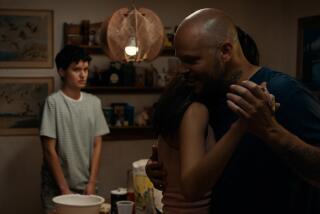Movie review: ‘In the House’ observes and reports with flair
- Share via
French director François Ozon can usually be counted on for dark irony of the juiciest sort — his 2003 “Swimming Pool” of sexual provocations comes to mind. But the filmmaker has an especially deft touch when a dash of comedy is mixed in. He uses this to delicious effect in his latest, “In the House.”
Adapted by Ozon from Spanish playwright Juan Mayorga’s “The Boy in the Last Row,” the literary conceit upon which this “House” stands required some maneuvering to open up the world of Claude Garcia (Ernst Umhauer). He is the talented and tricky 16-year-old whose imagination drives the film’s action — often in very concrete ways.
“In the House” opens on a new school year. Ozon quickly sets up the general uniformity of life that our protagonist is struggling against with a school-board mandate that students wear uniforms. Theoretically the dress code is designed to level the prep school’s playing field, but as the screen begins to fill with photos of the teens, their differences — their individuality — begins to get lost.
Within all that sameness, Claude doesn’t stand out either. He’s a back-of-the-class sitter, but a keen observer of human behavior. He also has a way with the written word. Germain (Fabrice Luchini) is Claude’s cynical, but primed to be captivated, literature teacher.
Germain’s first assignment — write about your weekend — changes everything for student and teacher. Its effect ripples throughout the film. While most of the papers are filled with clumsy sentences about trips to the mall and the appeal of pizza, Claude’s opens with a provocative account of his visit to a classmate’s house.
The “particular scent of a middle-aged woman” is the phrase that strikes Germain. The “to be continued” sign-off is what catches his wife, Jeanne’s (Kristin Scott Thomas) eye as she reads the papers over dinner. And with that, like a fish on a hook, the filmmaker has caught Germain, Jeanne and the audience on a line he’s going to take some time reeling in.
Germain’s primary orbit is classroom and home, where a settled existence with Jeanne has grown mundane. A mousy type is a bit of a stretch for Scott Thomas, but she manages nicely with sturdy shoes, bland clothes and hair that mostly hides those extraordinary cheekbones. Even when she is heading to bed we are treated to uninviting undergarments. Germain responds accordingly.
It is also why he is so seduced by what Claude writes. The intrigues under that other roof are so cleverly observed, the commentary on human behavior so sharp, the situations so amusing that Germain can’t wait for the next installment.
That need is the source of some of the funniest bits as Germain begins to pop up in the middle of things for sidebars with Claude on how he should re-imagine the moment. Umhauer is excellent in bringing a kind of comic physicality to all of Claude’s lurking about — it helps make the machinations less Machiavellian — and the veteran Luchini proves yet again what a good straight man he can be.
Math is what first got Claude in the door of his classmate’s home. He became a tutor to not-so-bright Rapha after a summer spent watching the house and its perfect family from the park bench across the street. The middle-aged woman who began things is Rapha’s mom.
It is easy to see why the teen has a crush on Esther; actress Emmanuelle Seigner has made her into a moody, elusive beauty. The elder Rapha (Denis Menochet) is a solid, athletic type who dotes on his son. The house itself is lovely. It is an existence easily envied by a boy whose father is on disability and whose mother left years ago.
But no life is perfect and soon the fractures are exposed as day after day Claude observes, writes and then leaves another chapter with his teacher. Germain, who has taken to tutoring the talented Claude, pushes him to write better, more inventively, to take control of his story. The very nature of storytelling and the creative give and take between writer and editor get equal ribbing and help lighten things up when all of Claude’s plotting causes a string of implosions.
Soon Germain can think of little else beyond what will happen next, even to the point of compromising his position at the school to ensure the story won’t end. Though Jeanne has her own life running a floundering avant-garde art gallery, which offers up its own brand of comic extremes, she is captivated enough by the tale of the Raphas, as they’ve been dubbed, to invite them to an opening so she can see them in the flesh.
There is a cost for obsession and the filmmaker gets a little hasty at the end when everyone is required to pay up. The toll exacted from Germain is exceedingly high. Indeed the final scene is so open-ended that like Germain, you won’t want the story to end.
‘In the House’
MPAA rating: R for sexual content and language
Running time: 1 hour, 45 minutes; French with English subtitles
Playing: At Landmark Theatre, West Los Angeles
PHOTOS AND MORE
Roger Ebert: Career in pictures
ENVELOPE: The latest awards buzz
PHOTOS: Greatest box office flops
More to Read
Only good movies
Get the Indie Focus newsletter, Mark Olsen's weekly guide to the world of cinema.
You may occasionally receive promotional content from the Los Angeles Times.











